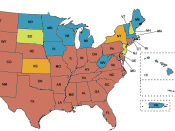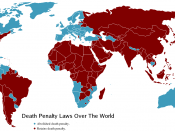Chapin: Death penalty is capricious The usual liberal arguments against the death penalty focus on the moral argument that the state does not have the right to take life or on the practical argument that the death penalty does not deter violent crime. In more recent years, liberals who have shifted to arguing the inherent racism or the inherent classism (rich people go free, poor people get executed) of the death penalty should invalidate it.
In individual cases these arguments have been supplemented by questions about the guilt of the person scheduled for execution -- amid growing evidence that many people on death row might not have committed the crimes of which they were accused.
Let's review these issues. The moral question, of course, is unlikely to be solved by debate. Many religious groups, including the Roman Catholic Church and many mainstream Protestant denominations, believe that the death penalty is morally wrong.
So do many secular liberals, and in most advanced countries, this combination of allies have had their way. Even Margaret Thatcher is an opponent of the death penalty.
In the United States, with its more violent individual history, and with so many conservative Protestants, this view is not a majority view.
Of course, the fact that more violent nations have more violent governments (or, for that matter, more violent American states have more violent governments) is hardly surprising. There's obviously some sort of "feedback" effect between the nature of a society and the way it is governed.
There's lots of evidence that the effect of the death penalty is marginal as to the commission of violent crimes. Ten of the 12 states that don't have the death penalty are among the lowest-crime states in the country (those 12 states are four New England states, the upper Midwest states...


